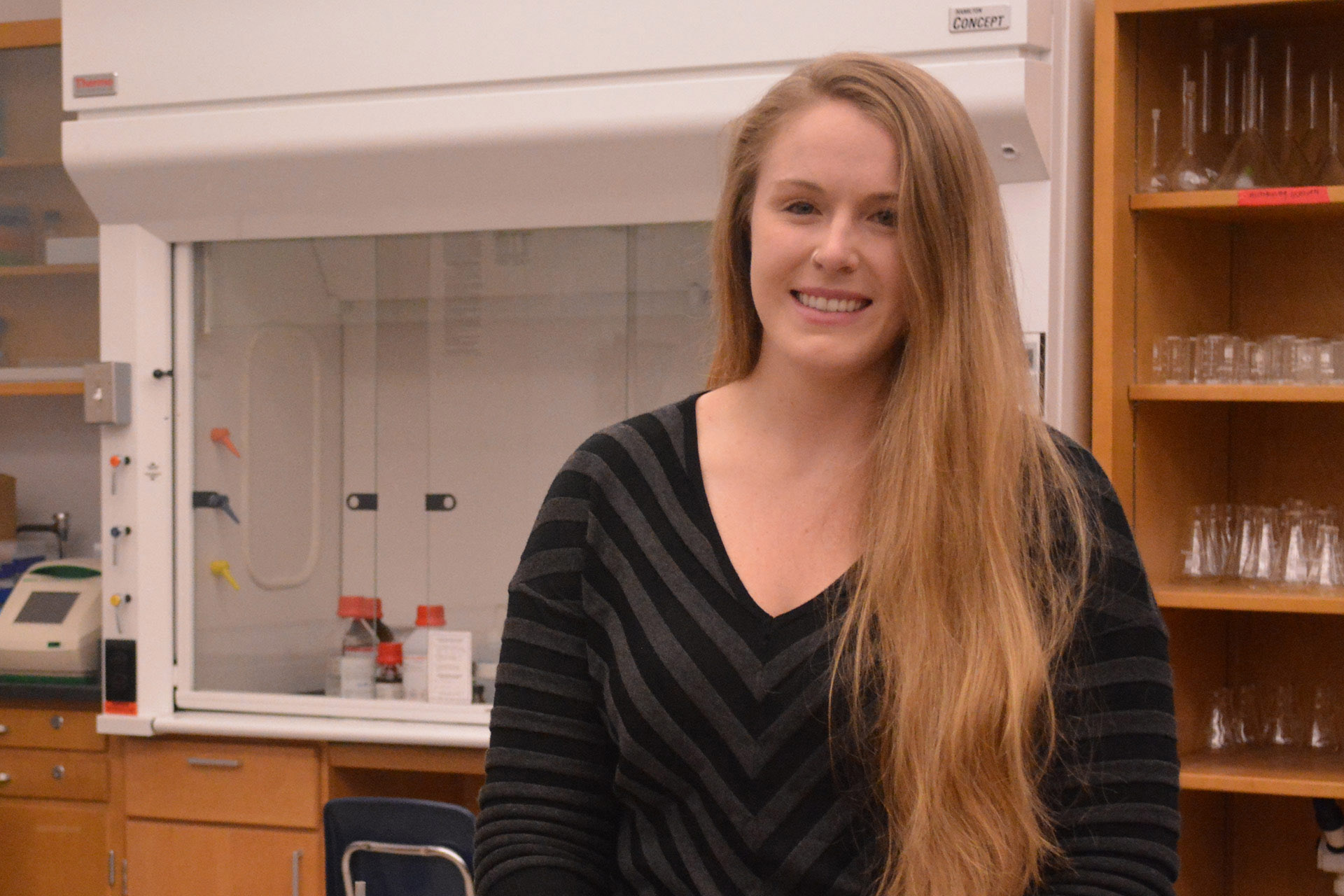- Future Students
- How to Apply
- Visit UHCL
- Admitted Students
- Tuition, Costs and Aid
- Degrees and Programs
- Contact Admissions
- Current Students
- Class Schedule
- Academic Calendar
- Advising
- Events
- Library
- Academic Resources and Support
- Student Services and Resources
- Alumni
- Lifetime Membership
- Alumni Events
- Update Your information
- Awards and Recognitions
- Give to UHCL
Student’s research aims to improve industrial safety
June 14, 2017 | George Mattingly II

Nearly 2.8 million workplace accidents and injuries were reported for the private
sector in 2015 in the United States, the Bureau of Labor Statistics reported in 2016.
Through her ongoing research on chemical-protective clothing, University of Houston-Clear
Lake environmental science graduate student Brittany Brown hopes to lower those numbers
and improve worker safety.
Brown presented her research on the chemical permeation of nitrile gloves at the annual American Industrial Hygiene Conference and Exposition in Seattle earlier in June. Each year industry experts, scholars and students gather at the event to address emerging trends, needs and research that impact industrial worker health.
“It was an absolutely amazing experience,” she said. “Approximately 130 conference attendees turned up for my talk and we received good feedback on the presentation and even had multiple requests to give the talk at other conferences and companies.”
To help fund her trip, Brown used a scholarship from the Gulf Coast Section of the American Industrial Hygiene Association. Each fall the organization awards top students studying industrial hygiene, a branch of the applied sciences in which students are trained to evaluate and control environmental hazards in the workplace.
Improving worker safety
Under the guidance of Robert Phalen, associate professor of Industrial Hygiene and Safety in UHCL’s College of Science and Engineering, Brown compared 10 brands of disposable nitrile gloves from a single manufacturer to see how each held up to standard ratings for chemical permeation.
First, they tested breakthrough time – how quickly a chemical permeates through a glove. Second, they tested the steady-state permeation rate, which tracks how fast a chemical can spread through a glove after breakthrough to make contact with skin.
Chemical contamination like this can be documented as accidental spills and can cause injuries to the skin or illnesses for industrial workers.
“A lot of manufacturers don’t chemically test their own products,” Brown said. “We wanted to bring attention to the fact that, when choosing gloves for the industry, there are important considerations to make in selecting chemical protective clothing.”
Their research found that the manufacturer’s ratings for each brand varied significantly from to the breakthrough times and permeation rates they documented. This oversight can create inaccurate impressions about the gloves’ resistance to chemicals, Brown said, so the duo then developed a more accurate rating system to better reflect the product’s performance.
Gaining experience for the real world
For Brown, the research project began as an engaging way to explore her field, but she didn’t anticipate how directly the project would advance her future goals. She works as a facility operations manager at Clean Harbors, an environmental management company that coordinates the disposal of waste, hazardous and non-hazardous materials for chemical companies.
Although she never planned to present or publish her research, Brown said her work with Phalen inspired her.
“I learned so much from Dr. Phalen about how important research and the publication process is. I know it’s going to help me in the future and by presenting it, I get to help other people.”
Brown initially presented her findings to her employer after completing her research in late 2016. Since then, her company is now considering upgrading the gloves employees use to improve worker safety.
“In the Houston area and in the chemical industry, people don’t always realize what chemicals they are working with,” she said. “They may be doing the work, but they may not have the knowledge on what these chemicals are and how they can impact them. That’s something I’d like to make employees more aware of in my career.”
Brown wants to become a board certified industrial hygienist or safety professional in the chemical industry, both internationally respected designations, so she can continue spreading awareness of protective clothing and how employees can safeguard themselves in the workplace.
For now, her focus is on continuing her research and finishing her degree at UHCL, with a projected graduation in May 2018.
Visit www.uhcl.edu/science-engineering to learn more about the College of Science and Engineering. To find out how you can support student success at UHCL, visit www.uhcl.edu/giving.






